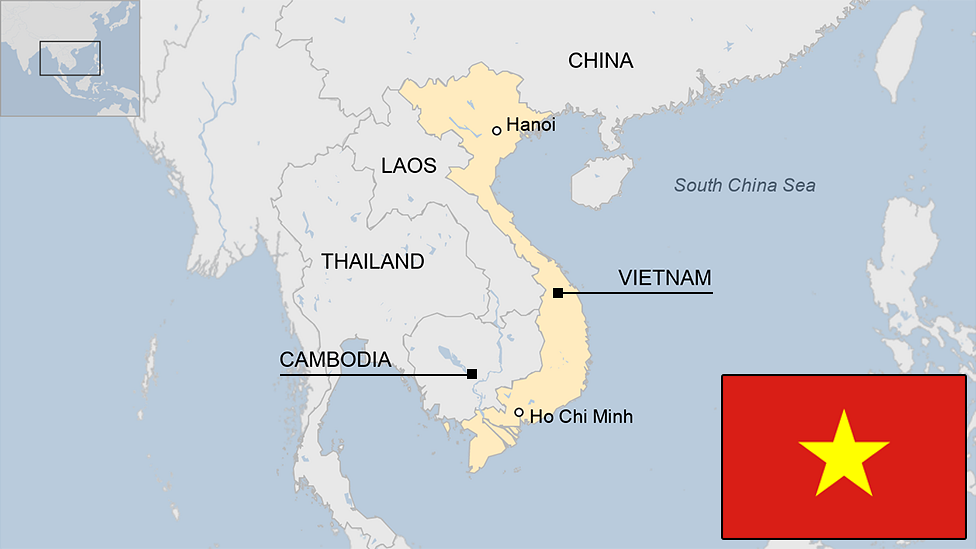Dong Tam village: Anger in Vietnam over deadly 'land grab' raid
- Published
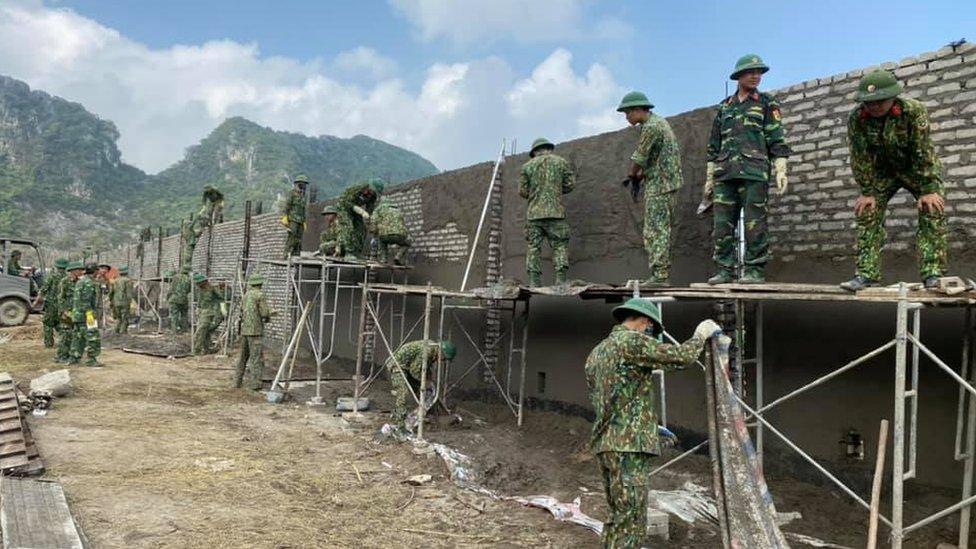
Three Vietnamese policemen who died during clashes over a land rights dispute have been buried with honours in Hanoi.
Their deaths came during a massive security operation last week in a village near the capital, in which a local leader also died.
Villagers had been resisting attempts by the military to build an airfield on their land for several years.
Land disputes are common in Vietnam, but rarely escalate into such conflict.
The raid and the unexplained death of the popular local leader, 84-year-old Le Dinh Kinh, have caused huge public controversy.
The government has blamed the officers' deaths on "rioters", but locals say police used excessive force.
President Nguyen Phu Trong posthumously decorated the officers, while Prime Minister Nguyen Xuan Phuc attended the funeral in Hanoi on Thursday, saying they "sacrificed their lives to protect the national security".
What is the dispute in Dong Tam?
The military began work on an airport at Mieu Mon, close to Dong Tam, about three years ago.
Local people say that in the process, about 50 hectares (124 acres) of their land was unfairly taken over and handed to Viettel Group, Vietnam's military-run communications company.
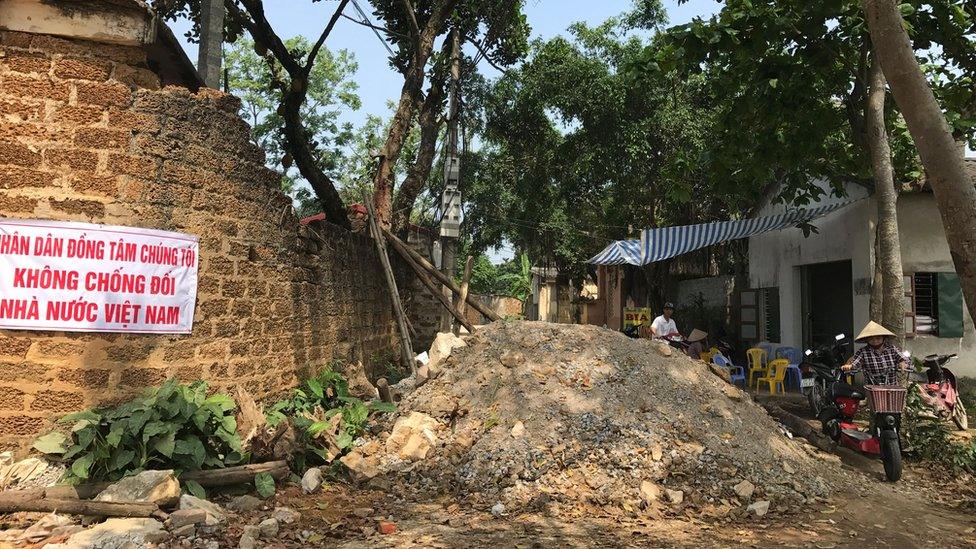
Protests first came to a head in Dong Tam in 2017
All land in communist Vietnam is owned by the state, so the government can technically use what it wants for military or civilian purposes. But locals say they have farmed the land for generations and were not being properly compensated.
Dong Tam first hit national headlines in 2017, when four people were arrested for "disturbing public order" in protests against the acquisition of the land.
Villagers retaliated by holding 38 officials, including police officers, inside a community house, for about a week. They were eventually released after the authorities agreed some concessions.
What happened in the 9 January clashes?
Villagers told BBC News Vietnamese that early that morning, up to 3,000 security personnel turned up.
"A lot of government people in mobile police uniforms, carrying sticks, clubs, clubs, guns, shields, rushed to the village," said one woman who asked to remain anonymous, fearing retribution. Another witness said the police "threw flares, fired tear gas, blocked every corner, beat up women and the elderly".
In a statement, the Ministry of Public Security said police had been sent to protect the public from protesters and to help the army build the boundary wall, a couple of kilometres away.
Construction of the wall annexing disputed land to the airfield was due to reach the edge of Dong Tam rural commune that day.
As workers began building the wall "some people resisted, using hand grenades, petrol bombs and knives to attack police forces, fighting officers on duty and disrupting public order", the statement said, according to VNExpress.
How did the four people die?
Le Dinh Kinh was a Communist Party member and retired local official. But in recent years he had become an unlikely opponent of the government.
He was leading a group of local people who had sworn to sacrifice their lives to defend the land. He had been detained - and allegedly beaten by police - during the 2017 clashes.
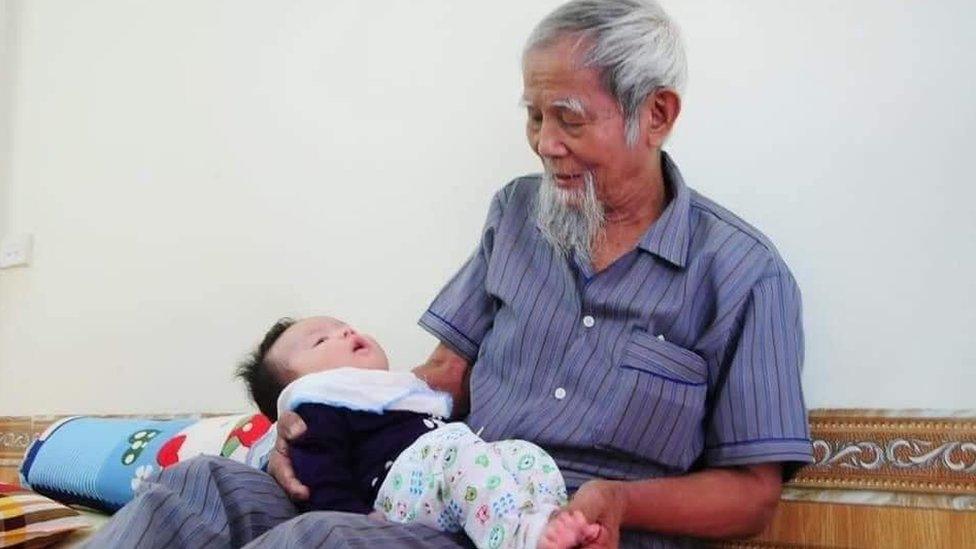
Le Dinh Kinh, a former government official, became a vocal opponent of the land grab
According to the security ministry, three police officers who entered the village - Col Nguyen Huy Thinh, Cpt Pham Cong Huy and Lt Duong Duc Hoang Quan - came under attack. They died after being set on fire.
Local authorities said Mr Kinh was found dead inside a house holding a grenade.
His family and supporters dispute this. They say a widely circulated video of his body shows apparent bullet wounds. His son, Le Dinh Chuc, was injured in the raid.
Deputy Minister Luong Tam Quang said police had seized petrol bombs, iron rods and other weapons. Twenty people are being investigated on murder charges.
On 13 January, three of Mr Kinh's family appeared on TV, with bruised faces, apparently admitting to possessing homemade weapons and petrol bombs. Rights groups have said these were forced confessions. , external
Mr Kinh's wife, Du Thi Thanh, also says she was beaten by police.
What's the response been?
The government and state-run media have painted Mr Kinh and the villagers as rioters and terrorists and the police officers as martyrs.
Coverage of the clashes on social media has been swamped by pro-government comment, while the government has demanded videos, articles and comments criticising the police operation be taken down.
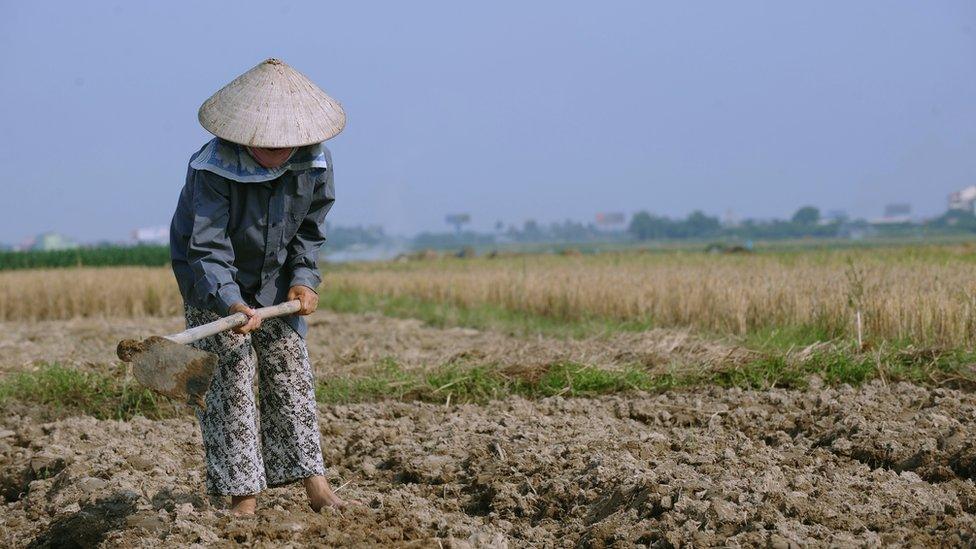
Land disputes are increasingly a flashpoint issue in Vietnam as the economy grows
Amnesty International said some users on Facebook had received warning messages saying their access was restricted "due to legal requirements in your country", something the rights group said was likely due to a flood of complaints from the government's significant "cyber troop force".
Radio Free Asia was also briefly blocked from uploading videos to its Vietnamese YouTube channel after being accused of violating "community guidelines".
"The authorities want to muzzle discussion of what happened in Dong Tam and avoid it becoming yet another touchpoint for popular discontent," said Amnesty's regional director Nicholas Bequelin, external.
"Silicon Valley cannot become complicit in this blatant attempt to keep Vietnamese citizens in the dark about human rights violations."
Nonetheless, many people have raised concern about the use of excessive force in the raid.
"My feeling is a boundary has been overstepped, by both sides. Sending thousands of armed troops into a village at 4am can't have been the right solution," Pham Thi Loan, a former MP representing Hanoi, told BBC Vietnamese.
Human Rights Watch called on Vietnam to hold anyone responsible for violence to account.
"Government officials need to recognise the importance of carrying out dialogues and negotiations with farmers to solve land disputes like Dong Tam in a peaceful manner rather than using violence," said Phil Robertson, the group's deputy Asia director.

Evicted and struggling to be heard
MyHang Tran, BBC News Vietnamese
There are thousands of land dispute victims across Vietnam, some homeless or living in miserable conditions, spending their days knocking on doors of government bodies, with land ownership documents in their hands, hoping for their case to be heard.
Some struggle to get by on compensation which, per square metre, is barely enough to buy a bowl of noodles. Some have taken their lives.
Le Dinh Kinh had regularly livestreamed to Facebook. He never spoke with hate about the government or the Communist Party. But he pledged the villagers would "fight to the very end" for the land they considered theirs.
This case has shaken the country. As Vietnam's economy is booming, and the government wants more land for development purposes, the fear is such cases could become more common.

- Published10 November 2017
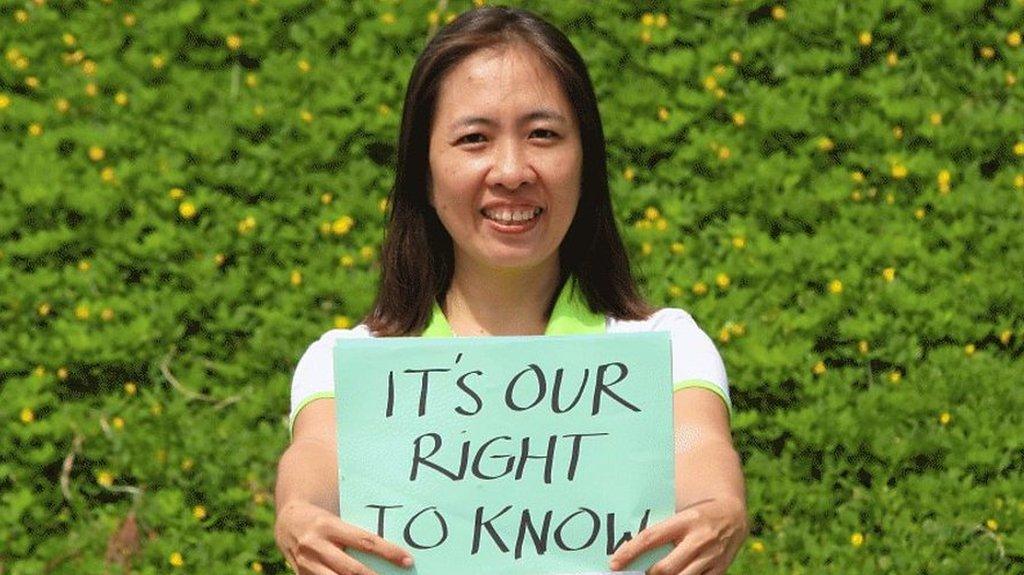
- Published23 October 2024
